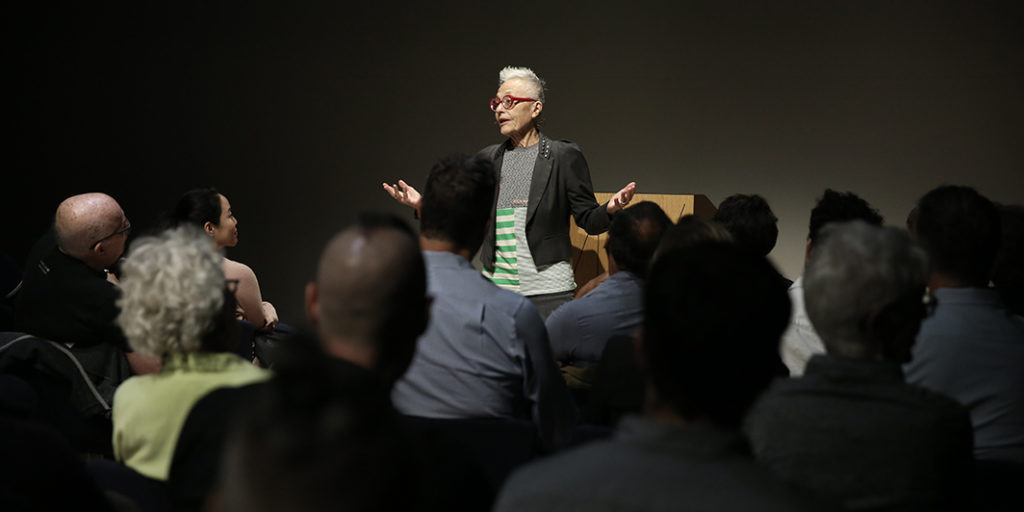“A More Daring Pleasure,” ARTFORUM
October 22, 2018
ARTFORUM

AT THE END OF Barbara Hammer’s performance a few weeks ago at the Whitney Museum, after a minutes-long standing ovation, Nicole Eisenman said to no one in particular, almost like a thought slipped aloud, “Barbara just invented a new genre. This was a reverse funeral, and it was amazing.” I relayed this half a week later, sitting by the window of Hammer’s studio just blocks down the Hudson from where two hundred or so of her fans, friends, and loved ones had gathered the Wednesday before. “I love her!” Barbara howled, laughing and clapping so excitedly that her dog, Dandy, came rushing to her side. “That’s great!”
Barbara Hammer is dying. “I hope that what is important to you stands out most clearly as it has for me, when life is measured in months instead of years. I hope you will make your work from the place of needing to create without paying heed to the sugarcoated traps of ‘success’ promised by ‘the art world,’” she says early on in The Art of Dying or (Palliative Art Making in an Age of Anxiety). Her lecture on living with advanced cancer while making art began as an impromptu award acceptance speech at Temple University last May, before being delivered at Tyler School of Art, Yale, and, finally, in tightened and crystalline form at the Whitney. “My work has always been about dealing with subjects that haven’t been brought forth,” Barbara said during my visit to her studio, when I asked her to reflect on the talk. “And if anything I’d like to be a role model, I’d like to say, join me! There’s nothing I like more than a lecture anyway!”
Barbara’s performative lecture, just shy of one hour, plays off of Rilke’s Letters to a Young Poet and offers seven precepts—culled from fifty years of artistic practice—as a scripted framework, which occasionally she abandoned at the lectern to set up clips of a handful of her many films, ranging from 1974’s Dyketactics to a full screening of the sublime Evidentiary Bodies from 2018. The script is clear and profound and should be published widely. That said, when Hammer lifts her head from the page to beam the full power of her charisma toward the crowd, it is electric. When she would, as she often did, gambol into the audience, row after row of beaming faces would ripple back, riveted, touched, at times torqued by emotion. One got the sense that hers is an alternating current. Here is a master at work, bestowing upon the gathered her lived experience and galvanizing influence. We were plugged into her, absorbing, and yet she seemed evermore charged.
Video by One Glass Video.
“Everyone has the right to die when she wishes,” Barbara stated from the lectern about halfway through her talk. “We don’t have the right to choose our birth but we should be able to determine the time of our death should we wish to. This especially applies to people like me with terminal cancer. I have lived a good long life but now I’ve reached a period of living with increasing diminished capabilities due to a cancer that can’t be cured and for which I have had every treatment possible. I am in palliative care and I am preparing for my end.” A dissonant web of responses rose in me: awe at the candor of her conviction and an overture of grief. I felt the wobbly apparatus of my own self-reflection touch down for a breath on mortality and its ethics, on the question of how I might proceed, given that I’m granted an option.
The scripted portion of the evening ended with Vintage Beinecke from 2018, a truly delightful GIF of Barbara hamming it up in a parade of her favorite “film show” outfits before they were shipped to the Beinecke Rare Book and Manuscript Library at Yale, where her paper archives are now held. Wading once more into the audience, she announced that she would hold an A&Q. “That means you answer, I query.” “What are you thinking about your death? Woooah!” she asked a bashful, thoughtful A.K. Burns. She gave a “free ride” to her longtime friend, the artist Jack Waters, who stood to embrace her while teasing, “I don’t think I’m the only one who refers to you as, simply, ‘The Hammer.’”
Moving along the front row, Barbara stood before her spouse of thirty years, Florrie Burke, who unsuccessfully tried to demur. “What would you say is the most difficult thing about me? And the most wonderful?” It took the audience, and the two of them, a beat to stop laughing before Florrie deadpanned, “You’re a Taurus and you’re really stubborn and bull-headed.” Florrie’s tone then shifted. “The wonderful part is? This was extraordinary. And yes it was very hard. I so admire you, and your strength, and your willingness to be open with all these wonderful people, and to share what’s very, very personal. Because it needs to be shared.”